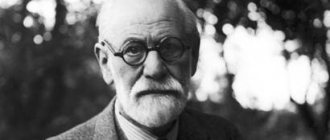The suggestible function , also called suggestive (from the Latin suggestio - suggestion) in Model A is the weak unconscious part of the psyche, responsible for the child’s assimilation of the knowledge accumulated by society. “Just do it and don’t think about it.”
According to the suggestible function, a person needs help and advice, perceives incoming information uncritically and with gratitude, and willingly believes any such information. If you want to pull the wool over someone's ears, do it with this weak function.
All personality types have areas where a person unconditionally believes everything they are told. Moreover, he believes immediately and makes no attempt to verify this information.
The information model of the psyche in socionics determines which aspect fills the suggestive function in each personality type.
Let's consider the manifestations of the basic for all possible aspects:
Suggestible introverted intuition, also known as White Intuition (BI) or “intuition of time”
The intuition of time is suggestive in Zhukov and Napoleon, who do not feel timeliness at all and often do not understand that at that particular moment something is required of them.
Both respect accuracy and punctuality, so they often listen to advice regarding the timing and duration of actions. They believe in signs and various predictions and can make a mistake, especially if the adviser with intuition does not have much time.
They constantly feel the need to foresee the future and need help making plans, who will correctly tell them when to start and how long it will last.
If the suggestive function is volitional sensory (ESENIN, BALZAC)
These people value strong-willed, strong, courageous, significant, bright, caring partners. They themselves are soft, compliant, refined, and do not show will unless absolutely necessary. It is difficult for the YESENINS and BALZACS to resist direct volitional pressure and stubbornly insist on their own. Regardless of their gender and status, they unconsciously wait for such a partner to “take him by the hand and lead.”
Examples:
— Surely, each of you knows people who look like a kitten named Woof (ESENIN). Suggestive volitional sensory is brilliantly illustrated by the story of how he decided to hide from a terrible thunderstorm in the dining room. But then he got bored there, and he again made his way to the attic, where during a thunderstorm it was much more scary and, therefore, more interesting.
— When asked about an ideal partner, the BALZAC girl, dreamily closing her eyes, said: “It’s so nice if someone big and strong would come up, take you by the hand and lead you. And you don’t have to think about what to do, so calmly when they decide for you.”
Suggested introverted ethics, also known as White Ethics (BE) or “relationship ethics”
The ethics of relationships is suggestive in Stirlitz and Jack.
Such people are characterized by the desire to obtain as much information as possible about people and their relationships in order to know how to communicate with them. They themselves have little understanding of this, but they are very concerned about how others treat them.
They can be gullible or overly suspicious. Therefore, they are looking for partners with people with high moral values, who will give the right advice on how and where to behave, will not be deceived and will take on part of the moral responsibility.
Without such tips, they may behave incorrectly in an unfamiliar company, so they become attached to a team they know well, for fear of losing their established relationships.
If the suggestive function is structural logic (HUGO, HAMLET)
These people get acquainted with new theories with pleasure and enthusiasm, study the rules, willingly follow them, and respect people of a scientific bent. They are usually good at counting change in a store, for example, reading instructions with interest, and loving the computer. After good training, HUGO and HAMLETS can, for example, teach mathematics or work as a programmer, but even in these cases they are more interested in people capable of serious discoveries than in the discoveries themselves.
Examples:
— The HUGO woman read and took notes on 200 books to write her dissertation. She was afraid of missing something important, so she carefully wrote down various thoughts, then trying to link them into a single whole. For a weak function, the sufficiency criterion does not work well. She stopped when the library ran out of books on the topic.
— Young HAMLET, a student at Bauman University, proudly calls his position “system administrator.” When asked what his responsibilities were, he said evasively: “Well, I’m responsible for everything. Specifically, to understand program failures - there are other people there for that. And if I suddenly spoiled something there, then I will tell them that this is how it should be.”
Suggestible extroverted logic, also known as Black Logic (BL) or “business logic”
Business logic is suggestible in Dreiser and Dostoevsky.
People with this personality type love to collect useful advice. Both easily adopt standard technological techniques and do a good job where the methods and goals are clearly indicated and try not to invent anything new where everything already works.
Since business advice is taken uncritically, they may choose the wrong course of action, recipe, or get carried away by dubious enterprises. Choosing from equivalent options is not their strong point, so they need people who can clearly state the problem and indicate ways to solve it.
Suggestive functionsLet us remember what in the world around us causes us a sincere and immediate surge of interest. What delights us in other people attracts attention in books and films. We are talking about plots and properties that we perceive uncritically, enthusiastically, with childish enthusiasm, sometimes surprising those around us. “What do you find interesting here?” - they ask with sincere misunderstanding.
The content of information that arouses genuine children's interest in each type is specified by the function that occupies the fifth cell of its model A. As in previous cases, we must remember that another suggestive type will have a different function that ends up in the fifth cell. And our enthusiasm may not be close to him at all.
The fifth function is suggestive.
"Entrance Gate" for information. It is believed that through it we receive information from the outside world without resistance and critical thinking in order to further process it in our consciousness with the help of other functions. Information on it attracts, makes a strong impression, and evokes unconscious trust.
The information received in the fifth cell, just like in the fourth, enters a one-dimensional, linear channel. Therefore, the degree of its successful development is limited to simple models. What is actually linear is learned correctly. What in reality corresponds to volumetric branched connections is simplified to simple circuits.
However, a person’s attitude towards information that falls into the fifth cell is completely different. He listens and remembers all information actively and joyfully, and is always open to new messages. The norms laid down here have indisputable authority. For example, if in childhood the norm “not to drink raw water” was laid down in the suggestive sensory system, then a person can boil water all his life, even if everyone around him drinks it raw straight from the spring.
The importance of the work of the suggestive function also lies in the fact that here are the plots of a person’s most personal and inspiring joys, his childhood dreams and fantasies, filling life with magical expectations. If a person, protecting himself from “extraneous influences,” closes his fifth function in order not to succumb to “temptation,” his life gradually loses its bright colors and sharpness of perception of the world.
Let's consider how various socionic functions manifest themselves when they fall into the fifth cell of model A. Here it is quite difficult to find examples from the lives of famous people, since outstanding results are not achieved directly from a weak unconscious function.
And those who have achieved results in their strong functions do not boast about their “weaknesses” in the suggestive aspect. If the suggestive function is the logic of action (DREISER, DOSTOEVSKY)
People of this type love to collect useful advice and easily learn standard technological techniques. They are happy to do work that has clearly defined goals and methods. They are not inclined to invent new ways of doing things, preferring to strictly adhere to a given technology. DREISERS and DOSTOEVSKIES can get carried away by dubious enterprises that seem profitable to them. They like people who are always ready to clearly set a task and figure out how to implement it.
Examples:
— Seventy-year-old woman DREISER, an experienced doctor, talks about how she cooks. “And I bake delicious pies, according to the recipe that my mother taught me. I always follow it exactly, and it turns out well. I once tried to change it a little, but it always turned out worse. So I always do it the same way.”
— The DOSTOEVSKY woman, who has a family and raised two sons, recalls her childhood dreams with rapture.
“And I always loved fairy tales where a magical assistant appeared and everything was done by itself. This is how I always wanted to get married, and so that somehow everything would be done by itself, and I wouldn’t have to do anything.” If the suggestive function is structural logic (HUGO, HAMLET)
These people get acquainted with new theories with pleasure and enthusiasm, study the rules, willingly follow them, and respect people of a scientific bent. They are usually good at counting change in a store, for example, reading instructions with interest, and loving the computer. After good training, HUGO and HAMLETS can, for example, teach mathematics or work as a programmer, but even in these cases they are more interested in people capable of serious discoveries than in the discoveries themselves.
Examples:
— The HUGO woman read and took notes on 200 books to write her dissertation. She was afraid of missing something important, so she carefully wrote down various thoughts, then trying to link them into a single whole. For a weak function, the sufficiency criterion does not work well. She stopped when the library ran out of books on the topic.
— Young HAMLET, a student at Bauman University, proudly calls his position “system administrator.”
When asked what his responsibilities were, he said evasively: “Well, I’m responsible for everything. Specifically, to understand program failures - there are other people there for that. And if I suddenly spoiled something there, then I will tell them that this is how it should be.” If the suggestive function is the ethics of emotions (ROBESPIERRE, MAXIM)
People of these types are greatly influenced by emotionally charged information. They are sentimental, sensitive and can be quite uncritical of the words of a person laughing, crying or showing fear. In such circumstances, usually reasonable ROBESPIERRES and MAXIMs can fulfill a request based not on reason, but on feelings, following the lead of other people's emotions. They value cheerful people who infect others with their enthusiasm.
Examples:
— The man ROBESPIERRE talked about how fascinated he is by synchronized swimming competitions. When he talks about this, it is clear that he is concerned about the aesthetic and emotional richness and excitement of this spectacle. Excited by the memories, he expressed his feelings this way: “And if a girl somehow jumps up and jumps beautifully, I really like it!”
— Young spouses, both MAXIMs, sometimes have fun in the following way: they make a real fuss, tickle each other, run after each other, poke each other in the stomach and laugh loudly.
In this way they manage to relieve stress, and knowledge of socionics allows them to justify this puppyish behavior by saying that “we need joy in the children’s block.” If the suggestive function is the ethics of relationships (JACK, STIRLITZ)
People of these types have little sense of the degree of sincerity of relationships, and can be trusting or overly suspicious. It is difficult for them to understand relationships with people, they are defenseless against the flattery of a charming interlocutor. JACKIE and STIRLITZ enjoy reading literature about building relationships, try to be polite, and observe corporate ethics. They are attracted to subtle, psychological partners who are able to show their devotion and reliability.
Examples:
— The director of a large enterprise (JACK) talked about one of his employees: “He enters the office and immediately begins to say how much he respects me and how pleasant it is for him to work with me. I don’t know how to feel about this, whether it’s sincere or not.” And he added in confusion: “After all, you can believe it...”
— Svetlana Druzhinina (SHTIRLITS), a famous and successful film director, answered a journalist’s question about her marriage, which has lasted 45 years: “I don’t know what love is, and I don’t know what a habit is.
Even before the wedding, we didn’t declare our love to each other. True, a few years later I was forced to make a confession, and at the defense of my director’s diploma... The chairman of the commission, Babochkin, had complaints: “Is this how one declares love? This is how you would do it? - "I? Well, now you will witness how, in the tenth year of our marriage, I will declare my love to my husband sitting in the auditorium. Tolya, I love you very much, and our children are proof of this.” Ingenuity of any type in terms of suggestive function is not great. If the suggestive function is volitional sensory (ESENIN, BALZAC)
These people value strong-willed, strong, courageous, significant, bright, caring partners. They themselves are soft, compliant, refined, and do not show will unless absolutely necessary. It is difficult for the YESENINS and BALZACS to resist direct volitional pressure and stubbornly insist on their own. Regardless of their gender and status, they unconsciously wait for such a partner to “take him by the hand and lead.”
Examples:
— Surely, each of you knows people who look like a kitten named Woof (ESENIN). Suggestive volitional sensory is brilliantly illustrated by the story of how he decided to hide from a terrible thunderstorm in the dining room. But then he got bored there, and he again made his way to the attic, where during a thunderstorm it was much more scary and, therefore, more interesting.
— When asked about an ideal partner, the BALZAC girl, dreamily closing her eyes, said: “It’s so nice if someone big and strong would come up, take you by the hand and lead you.
And you don’t have to think about what to do, so calmly when they decide for you.” If the suggestive function is the sensory of sensations (DON QUIXOTE, HUXLEY)
To dress for the weather, improve everyday life, and health, people of these types require great effort and concentration. They appreciate sensory care, reminders to eat and rest on time, tips on how to dress for the weather, and take care of their appearance. It is difficult for DON QUIXOTE and HUXLEY to resist bodily and culinary temptations and to refuse beautifully presented offers. They value in their partners the ability to care, provide comfort, and the ability to enjoy life.
Examples:
— The man DON QUIXOTE enthusiastically explained that a woman must certainly take care of herself, otherwise, in his opinion, she is not a woman. He said: “I really like it when a woman has a lot of all kinds of jars and bottles, when she is well-groomed. Her skin should be soft and she should smell very good. She should figure this out. And she should all be so beautiful and well-groomed. That’s when I really like her.”
— Public favorite Noe Wyle (Dr. Carter from the popular TV series “ER”) set up a real farm in his villa.
In his free time from filming, he personally takes care of his pets and enthusiastically tells reporters about it. If the suggestive function is the intuition of possibilities (DUMAS, GABIN)
People of these types are gullible in the unusual, suggestible, unsure of their capabilities, therefore they really do not like even harmless practical jokes. They love science fiction, original universal theories, and paradoxical statements. DUMAS and GABENS respond with pleasure to new ideas, love to receive fresh information, in which, however, they do not distinguish what is really possible from empty inventions. They respect their partners' breadth of outlook, intuition and originality of outlook on life.
Examples:
— In the statements of Mikhail Zhvanetsky (DUMA), sometimes one comes across phrases expressing surprise at incomprehensible phenomena: “He died without finding meaning in life, and he died without finding meaning in life, and he died without looking for meaning in life, and this one still lives! We need to talk to him." Or an admiring reflection on the attraction of the sea: “And why do people want to live near the sea? And what is it there, in this sea, if you come to it, and live next to it, and it seems to you that everything - you have achieved your goal. You can live next to such a person as the sea. And people pay a lot of money - just to get closer, closer. And get settled, and be nearby... You understand that it doesn’t depend on anyone. It is like this from one side to the other, it divides someone, connects someone. And that’s why I can’t live without Odessa, that’s why I built a house there. When I see a window half filled with water, I don’t need anything else.”
— Computer scientist GABEN once spoke with an expression of childish joy on his face about his acquaintance with an optical mouse: “They brought an optical mouse into our room.
We first tried it on a rug - it works. They put it on the newspaper - it works. Then they tested it on cardboard - it works. Finally, we finally figured out where to put it - on the mirror! But it still doesn’t work on a mirror!” The story was accompanied by the most spontaneous childish laughter, which you don’t hear very often from GABEN. If the suggestive function is the intuition of time (ZHUKOV, NAPOLEON)
People of these types tend to respect accuracy and punctuality. But they themselves are easily knocked off the given rhythm; they need help in making plans and maintaining a stable rhythm of life. It can be difficult for ZHUKOVS and NAPOLEONS to change their activities in time and notice new trends. In partners they value quick reactions, forethought, and ease of mind.
Examples:
— Mikhail Gorbachev, the initiator of great changes in Russia, was certainly passionate about his role as a reformer, a bearer of new ideas. But how weak his predictive abilities were was shown by the subsequent development of events, including the coup and the subsequent collapse of the great country, about the future of which he cared so much.
— The already mentioned mayor Yu. Luzhkov is restoring historical monuments of Moscow with great enthusiasm. It is possible that, among other goals, he is captivated by the idea of going down in history with the newly rebuilt Cathedral of Christ the Savior. But it seems that he himself does not really feel the difference between the remake and the historical original.
Table of contents
Introverted sensory, also known as White Sensory (BS) or “sensing of sensations”
The sensory of sensations is a suggestive function in Don Quixote and Huxley.
They love to receive information about personal care, apartment design, and a healthy lifestyle. They are willing to talk about this and offer various ideas for improving comfort.
Their main problem is that they do not always understand the reason for their poor health. Both may forget to eat, rest, overheat in the sun, or, conversely, sit in a draft and get sick. Therefore, all their accumulated knowledge in this area will lead to nothing if there is no one nearby who will create a comfortable environment and promptly tell them how to dress for the weather and improve their everyday life.
If the suggestive function is the ethics of emotions (ROBESPIERRE, MAXIM)
People of these types are greatly influenced by emotionally charged information. They are sentimental, sensitive and can be quite uncritical of the words of a person laughing, crying or showing fear. In such circumstances, usually reasonable ROBESPIERRES and MAXIMs can fulfill a request based not on reason, but on feelings, following the lead of other people's emotions. They value cheerful people who infect others with their enthusiasm.
Examples:
— The man ROBESPIERRE talked about how fascinated he is by synchronized swimming competitions. When he talks about this, it is clear that he is concerned about the aesthetic and emotional richness and excitement of this spectacle. Excited by the memories, he expressed his feelings this way: “And if a girl somehow jumps up and jumps beautifully, I really like it!”
— Young spouses, both MAXIMs, sometimes have fun in the following way: they make a real fuss, tickle each other, run after each other, poke each other in the stomach and laugh loudly. In this way they manage to relieve stress, and knowledge of socionics allows them to justify this puppyish behavior by saying that “we need joy in the children’s block.”
If the suggestive function is intuition of possibilities (DUMAS, GABIN)
People of these types are trusting of the unusual, suggestible, unsure of their capabilities, and therefore really dislike even harmless pranks. They love science fiction, original universal theories, and paradoxical statements. DUMAS and GABENS respond with pleasure to new ideas, love to receive fresh information, in which, however, they do not distinguish what is really possible from empty inventions. They respect their partners' breadth of outlook, intuition and originality of outlook on life.
Examples:
— In the statements of Mikhail Zhvanetsky (DUMA), sometimes one comes across phrases expressing surprise at incomprehensible phenomena: “He died without finding meaning in life, and he died without finding meaning in life, and he died without looking for meaning in life, and this one still lives! We need to talk to him." Or an admiring reflection on the attraction of the sea: “And why do people want to live near the sea? And what is it there, in this sea, if you come to it, and live next to it, and it seems to you that everything - you have achieved your goal. You can live next to such a person as the sea. And people pay a lot of money - just to get closer, closer. And get settled, and be nearby... You understand that it doesn’t depend on anyone. It is like this from one side to the other, it divides someone, connects someone. And that’s why I can’t live without Odessa, that’s why I built a house there. When I see a window half filled with water, I don’t need anything else.”
— Computer scientist GABEN once spoke with an expression of childish joy on his face about his acquaintance with an optical mouse: “They brought an optical mouse into our room. We first tried it on a rug - it works. They put it on the newspaper - it works. Then they tested it on cardboard - it works. Finally, we finally figured out where to put it - on the mirror! But it still doesn’t work on a mirror!” The story was accompanied by the most spontaneous childish laughter, which you don’t hear very often from GABEN.










